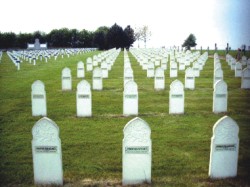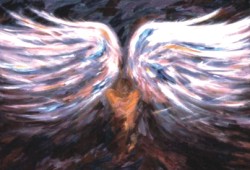|
Musings
Reflections on death, as it Drizzles
Syed Badrul Ahsan
 There are all the times when thoughts of my own death leave me in a state of sheer excitement. You might ask why such dark thoughts must come into one who as yet shows no sign of passing on to the great beyond. Ah, but there is the point. You cannot be sure that what you do today is what you will repeat tomorrow, for tomorrow might not come at all. In these past several years, I have seen a good number of people I knew, friends I loved to interact with, collapse in death for little rhyme or reason. More than twenty years ago, a friend succumbed to leukaemia. He did not know he had the disease. Neither did we. He simply checked into a hospital, smiling and joking all the way. We visited him, told him he had no business being there. He agreed. Thirteen days later, it was his limp, swiftly stiffening body that emerged from that ward. In that same year, another friend died in circumstances that remain mysterious. He used to teach in an English medium school here in Dhaka with me. Then he left his job. Months later, a small news item in a local daily spoke of his death in prison in a small town in this country. His entrails were sent to Mohakhali for reasons of autopsy. There are all the times when thoughts of my own death leave me in a state of sheer excitement. You might ask why such dark thoughts must come into one who as yet shows no sign of passing on to the great beyond. Ah, but there is the point. You cannot be sure that what you do today is what you will repeat tomorrow, for tomorrow might not come at all. In these past several years, I have seen a good number of people I knew, friends I loved to interact with, collapse in death for little rhyme or reason. More than twenty years ago, a friend succumbed to leukaemia. He did not know he had the disease. Neither did we. He simply checked into a hospital, smiling and joking all the way. We visited him, told him he had no business being there. He agreed. Thirteen days later, it was his limp, swiftly stiffening body that emerged from that ward. In that same year, another friend died in circumstances that remain mysterious. He used to teach in an English medium school here in Dhaka with me. Then he left his job. Months later, a small news item in a local daily spoke of his death in prison in a small town in this country. His entrails were sent to Mohakhali for reasons of autopsy.
Thoughts of death have assailed me since my days in school. No, there has never been in me any fear of death. I have often wondered how it would feel to die. If there is a soul in me, someday I would like it to travel all across the spaces between the worlds and experience matter in all manner of infinity. People of my generation have watched millions die in the War of Liberation. Death was the pattern upon which life shaped itself for us in that long ago year. My cousin was picked up by the Pakistanis, never to return. There has hardly been a day since the moment of our liberation that I have not brooded on all those brave freedom fighters who never made it back to their country, to their families. For years after the war, I ran into stories of ageing parents waiting for their young sons, those who had gone to the war in defence of freedom, to return. Of course they did not return; and all those parents slowly and imperceptibly saw the life going out of them even as they waited in the gathering dusk for their soldier children to come home. There are times when I sit back, as it rains outside, and let my mind wander into thoughts of the brave politicians we have lost to time. I cannot think of Dhaka Central Jail without reminding myself that the four leaders of the Mujibnagar government were done to death in its supposedly secure confines. Every time I pass by Bangabandhu's residence in Dhanmondi, the heart-rending image of his lifeless form sprawled on the stairs comes rushing back into the consciousness. I knew him once. He once pulled me by the cheeks. And so it is not just politics but matters personal that come alive with my remembrance of the great man.
 |
Painting by Raphael Sirianni. |
It is in such grim moments of recalling men who do not live any more that I think of the end that will be mine. I go around joking, with family and friends, that perhaps my body will never be found, that maybe I will perish in an air crash or be blown up in a minefield in some distant, dangerous corner of the world. There are other possibilities that well up in the mind. What happens if a brain haemorrhage occurs? Or what do I do if the heart suddenly and without warning stops beating one morning, or late one night? There are far too many stories than I can recount of the many ways in which people have died in all the years I have lived. A colleague of my father's suffered a stroke, even as he turned on the tap in the bathroom, and simply died in that position. Relatives have felt the life going out of them even as they have knelt on the prayer mat in the twilight hour. A schoolboy, not much younger than me, saw his feet slip on the muddy road in a long ago monsoon and plunged into the floodwaters beside it. He did not know swimming and died in the water. Many years later, it was John Kennedy Jr. and his wife and sister-in-law who plunged into the Atlantic when their aircraft veered out of control. When the plane was located on the bed of the sea, the young son of JFK was found holding, in the stiffness of death, the steering of the aircraft. Tragedy cannot be greater than that. Or maybe there are bigger tragedies around us. Think here of the Titanic as it slowly sank in the ocean on a sinister night in 1912. You see the remains of the ship in the bottom of the sea. You do not see the bones of those who went down with it. Life then begins to lose all meaning for you, for everyone around you.
In the witching hour of the night, I count the minutes as they tick away on the clock. The faces of the babies in the family, with whom I spend my unfettered moments, float in my imagination. The brilliant eyes of the woman I married long ago still kindle in me a huge desire to pen poetry in her name. There are the friends I do not forget, the winds I still hear in the stillness of the hour. I do not know if I should be in the mood to be forgiving toward death should it come to me any time soon. But then, mortality has hardly a choice before it. It stands little chance against inevitability.
As the nocturnal hour creeps into ever-enveloping darkness, I listen to Rabindranath Tagore: 'Aji mormoro dhoni keno jagilo re / momo pollobe pollobe hillole hillole / thoro thoro kompono lagilo re.' The wind outside my window scatters the softly falling drizzle. I think of the eerie silence around the graves that hold the remains of my father and my mother. Only the other day, my siblings and I went home to them at dusk, to bask in the warmth we first knew when they held us close to their bosoms. We were babies then.
Copyright (R) thedailystar.net 2007 |
